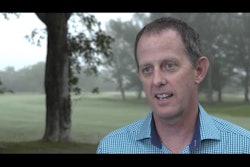You've been in business several years now. You work hard, your crews work hard, and all too often days and nights run together. You like what you do, but may not want to work like this forever. You have a decision to make.
Do you want to stay at the owner/operator level, or do you want to grow your company and be able to spend more time, as they say, working on your business, as opposed to just in it?
Nearly every successful landscape and lawn maintenance contractor started out as an owner/operator. Some have chosen to remain small, and cannot be faulted for making that decision. Others have selected a different route, with an eye toward growing a business and creating more opportunities for themselves and their employees.
Assume for a moment that you're in the second category. Where do you start? How do get from point A (where you spend 95% of your time in the field) to point B (where you can allocate several hours a day doing things that business people and owners do)?
What do you want to be, and to who?
"My goal was to retire at age 36," says Kurt Kluznik, president/CEO of Cleveland-based Yardmaster. "Of course, that was pure fantasy. But the point is, from the very beginning I wanted to become a business person and grow my company.
"Probably the biggest question owner/operators should ask themselves is, 'What do I want to be?' If the answer is to be more of an owner than an operator, then they need to start thinking seriously about their service offering and customer base. They also may want to consider bringing in a mentor or another third-party individual to provide an objective appraisal of their business."
As Kluznik points out, when starting out, it's easy to get in a rut and focus on issues that are either out of your control or won't have a meaningful impact on business growth. A mentor may recommend that a new owner hire a key person, simplify equipment brands, or spend less time socializing with employees. A third-party perspective may encourage the owner/operator to set up monthly P&L reports or even construct a budget.
"When I started in business in 1971, the main thing I measured each month was my checking account balance to see if I had enough money to pay the bills," Kluznik recalls. "Most of us started that way, but it sure would have been great to be forward-thinking enough to have a budget and monthly P&L statements. Learning to take important financial planning steps would have made the transition to running a true business much less arduous."
Green industry consultant and veteran landscape contractor, Rod Bailey, agrees. "Take a few courses in financial management before doing anything else," he advises owner/operators. "Then, start looking at objectives. Develop a plan. What kind of business do you want to be in? What kinds of customers do you want and what kinds of services do you want to offer them? Once owner/operators identify their ideal customers, they can begin to target the good ones and weed out the bad ones."
But it all starts by having a strategic plan, Bailey emphasizes. "Having a plan and focus, and setting growth goals for three to five years down the road, will allow owners to make good decisions about equipment and people."
Bailey says he initially wanted to be a consultant, but needed five to six years of real-life experience to give him credibility. Thirty years later, he sold his landscape contracting business to pick up where he left off.
"Over the years, one tends to forget those important first lessons," Bailey relates. "When I talk with groups today or mentor individual contractors, I start out by asking them if they would plant a landscape without a landscape plan. Of course, the answer is no, and the same theory applies to operating a business. It starts with a plan."
Focus builds strength
"My best advice to operators large and small alike is to focus," says Dan Foley, president of D. Foley Landscape in South Walpole, MA. "One of the big challenges in this industry is to find a niche among so many different service offerings, customers and markets. It can be confusing, especially when starting out. I suspect that most successful landscape contractors have identified services and markets that were the most fun and profitable for them, and they placed their energies there."
Foley emphasizes that the word focus applies equally to a maintenance company's two biggest investments: employees and equipment. "The labor issue can sometimes seem more difficult than it really is," he remarks. "Planning ahead and forecasting needs can often head off most shortfalls in labor."
The real challenge is to hire and retain employees who are willing and capable of taking on more responsibility, he adds. "We've learned to be more careful upfront and hire individuals who first and foremost have the right attitude. It's more important to bring in people who want to work and who will fit into your culture than it is to hire people based solely on their experience." As Foley points out, you can train people but you can't train attitudes.
This owner also challenges himself and his employees to find and develop talent every day. "We encourage supervisors to have one-minute coaching moments with their direct reports, and I strive to do the same with mine," Foley tells. "I also set aside an hour a week to coach supervisors and managers. If you're going to grow your company, you first have to grow your people."
Equipment is a different matter altogether, says Foley. "Many of us, especially young owner/operators, become enamored with equipment and buy products that are used sparingly. Knowing when to buy vs. when to rent vs. when to use subcontractors is part of the growing process. So, too, is buying equipment that lines up squarely with a service offering and limiting the number of brands in the shop. Having fewer brands simplifies maintenance and operation, and reduces parts inventory."
Roscoe Klausing, president/CEO of the Klausing Group in Lexington, KY, calls this line of reasoning "having a product line focus instead of a product focus." "When I started my company in the early 1990s, we had several different brands of equipment. I wanted the most powerful blower, the best string line trimmer and the most efficient mowers. In theory that was a good approach, but I ended up with several equipment brands and working with a couple of dealers. Now I stay with one brand and one dealer."
Put the owner mentality to work
Klausing started his business in 1992 while still in high school. He then incorporated five years later. "We were doing everything under the sun for everyone under the sun," he recalls. "I made choices by default, and the idea that there were different markets and different segments never occurred to me. Then, in 2000, I brought in Rod Bailey, who helped me write our first business plan. I targeted the market with which we were most comfortable (commercial maintenance), which is still our focus today."
The young entrepreneur likes to say he has made the transition from being a landscaper to being a businessman in the field of landscaping, and hopes to have created a business entity that can operate in his absence. It all goes back to that original business plan, Klausing emphasizes. "I looked at our customer base and decided I wanted to be in the commercial maintenance market. I attached a figure to the number of customers I wanted and how much revenue on average each would generate."
Once owner/operators have a plan, they can move forward with commitment and determination, Klausing adds, noting that the biggest stumbling block from that point on is commitment. "You have to really want to grow and become a true owner, to the point that you spend off hours reading extra books and magazines. You'll even keep that appointment with your CPA despite the fact that work is backing up and days are getting shorter. In 2000, in addition to writing our first business plan, I also blocked out some time every day to get out of the field to sell and plan, and to do those things that could help our business grow."
As Klausing points out, there's a difference between having an owner's mentality and actually putting that mentality to work. Like Bailey, Klausing advises owner/operators to either learn to work with business financials or work with a financial person who will work with you. "If you choose to hire someone to manage your finances," Klausing adds, "be prepared to listen and take their advice."
Make it official
The above veterans have a few more tips on ways to develop an owner's mentality. "Decide if you're going to become incorporated or operate as a sole proprietorship," says Bailey. "Becoming incorporated as an LLC, S-Corp or C-Corp not only limits liability, but also alerts owners to the financial responsibilities that come with operating a business."Too many owner/operators, Bailey adds, learn the hard way about tax laws, worker's compensation and other less-than-fun but requisite subtleties that come with being a business owner.
"Find a mentor, hire a consultant, or join your state association," advises Kluznik. "When I started, a couple of area contractors took it upon themselves to help me along. Their advice was instrumental to our early success. Consultants may be too costly at first, but their help can be invaluable when a company approaches the half-million-dollar to $1 million level. Joining PLANET is affordable for emerging contractors, and its resources and networking opportunities are worth the investment."
Foley adds, "All business owners, large or small, run the risk of spending so much time and effort thinking about their operations that they ignore the customer. I don't mean that they completely ignore them, but it's easy to forget that they have issues, too. Having an understanding of customers' concerns will help shape the type and level of service a contractor offers."
"Steady, profitable growth is what you're looking for," says Klausing. "I operate managers, now, instead of operating a business. I wouldn't be at that point without growing and creating career paths for employees."
Their advice is well taken for both small owner/operators and owners of large companies who spend too much time working in their businesses. Developing an owner's mentality begins with having a desire and commitment to be an owner and creating a plan of attack. True, some people become successful in business by default. The majority of them, though, have a plan and follow through with it.
Nurturing a business mentality
- Decide who you want to be
- Create a plan of attack, set goals
- Obtain some financial management skills
- Seek out a mentor or join a professional group
- Find a niche
- Hire with "attitude" in mind
- Coach employees
- Strive for dealer and brand loyalty
- Stay committed
- Understand your customers
- Target steady, profitable growth

![Doosan Bobcat Wacker Neuson Stack 2ec Js Pb V6e[1]](https://img.greenindustrypros.com/mindful/acbm/workspaces/default/uploads/2025/12/doosan-bobcat-wacker-neuson-stack2ecjspbv6e1.CPyyz8ubHn.png?auto=format%2Ccompress&bg=fff&fill-color=fff&fit=fill&h=100&q=70&w=100)








![Doosan Bobcat Wacker Neuson Stack 2ec Js Pb V6e[1]](https://img.greenindustrypros.com/mindful/acbm/workspaces/default/uploads/2025/12/doosan-bobcat-wacker-neuson-stack2ecjspbv6e1.CPyyz8ubHn.png?ar=16%3A9&auto=format%2Ccompress&bg=fff&fill-color=fff&fit=fill&h=135&q=70&w=240)








